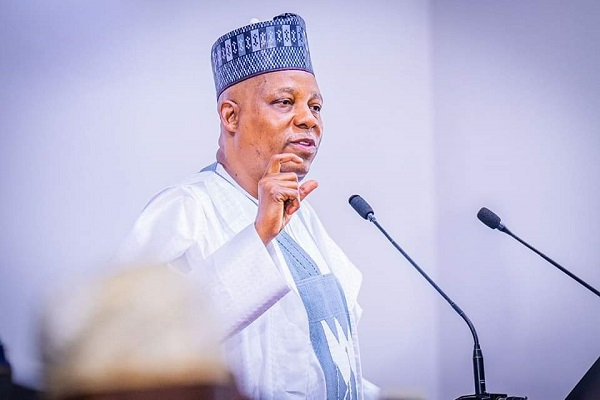Vice President Kashim Shettima’s recent diplomatic foray into Sweden has sparked a flurry of optimism about Nigeria’s economic prospects. But as we’ve learned from past experiences, the devil is often in the details – or in this case, the follow-through.
Let’s unpack this high-stakes chess game of international diplomacy and investment promises.
First off, the sheer scale of commitments is eye-catching. Gluwa’s $100 million pledge for MSMEs and digital skills training, coupled with Ericsson’s $19 million tech hub investment, paint a rosy picture of Nigeria’s burgeoning digital economy.
But haven’t we danced this dance before? How many times have we heard of grand investment promises that fizzled out faster than a generating set during a fuel scarcity?
That said, there’s something different in the air this time. The Tinubu administration’s bold economic reforms – controversial as they may be – seem to have caught the attention of the international business community.
The removal of fuel subsidies and the unification of exchange rates, while painful for the average Nigerian in the short-term, are exactly the kind of moves that make investors’ ears perk up. Are these moves popular? Hell no. Are they necessary? Well, that’s the million-naira question, isn’t it?
But let’s not get ahead of ourselves. These Swedish commitments, while promising, are still just that – promises. The real test will be in the implementation. Will we see these millions actually hit Nigerian soil, or will they get lost in the labyrinth of bureaucracy and, dare I say it, corruption that has stymied so many previous initiatives?
The focus on the digital economy is particularly intriguing. Nigeria’s tech ecosystem has been punching above its weight for years, with companies like Flutterwave and Paystack making waves globally. If these Swedish investments can help nurture the next generation of Nigerian tech unicorns, that could be a boost for our economy.
However, we need to ask some hard questions. How will these investments benefit the average Nigerian? Will the jobs created be accessible to those outside the urban tech bubbles of Lagos and Abuja? And crucially, how will we ensure that the fruits of these investments are distributed equitably, rather than further widening the gap between the digital haves and have-nots?
The MoU with Ericsson on 5G technology is another potential feather in Nigeria’s cap. But let’s be real – we’re still struggling with providing stable electricity to large swathes of the country. In the last one week, the national grid has collapsed three times – a record. How do we balance the push for cutting-edge tech with the need to address basic infrastructure challenges?
Shettima’s exploration of green transport solutions with Scania is commendable, especially in the light of our recent pivot towards CNG. But again, we need to see concrete plans. How will these green solutions be integrated into our existing, often chaotic, transport systems? And more importantly, how will they be made affordable for the average Nigerian commuter?
The vice president’s diplomatic schmoozing with the Swedish prime minister and various business leaders is all well and good. But we’ve seen this movie before – handshakes, smiles and vague promises of “deepening collaboration.”
Don’t get me wrong, there are some positives here. The fact that we’re attracting this level of interest from Swedish investors is a good sign. It shows that maybe, just maybe, the international business community is starting to take us seriously again.
But – and this is a big but – we need to be smart about this. We can’t just roll out the red carpet and hope for the best. We need to ensure that these investments, if they do materialise, are used wisely and benefit the majority of Nigerians, not just a select few.
So, what’s the bottom line here? Is Shettima’s Swedish adventure a game-changer for Nigeria’s economy? The jury’s still out on that one. It’s got potential, sure. But potential doesn’t pay the bills or create jobs.
What we need now is action. Real, concrete action. Not just handshakes and photo ops, but actual investments hitting the ground. We need to see these millions turning into jobs, into improved infrastructure, into a better life for the average Nigerian.
Until then, colour me cautiously optimistic. I’ll believe it when I see it. And when I do see it, trust me, I’ll be the first to give credit where it’s due. But for now, let’s not count our Swedish chickens before they hatch.
In the meantime, I suggest we keep our eyes on the ball. Let’s focus on solving our immediate problems – electricity, security, education. If we can get those right, then maybe, just maybe, we’ll be in a better position to make the most of these foreign investments, Swedish or otherwise.
So, here’s to hoping that Shettima’s Swedish sojourn turns out to be more than just another diplomatic dance. Let’s hope it’s the beginning of something big. But let’s also remember – hope is not a strategy. We’ve got work to do, people. Lots of it.





